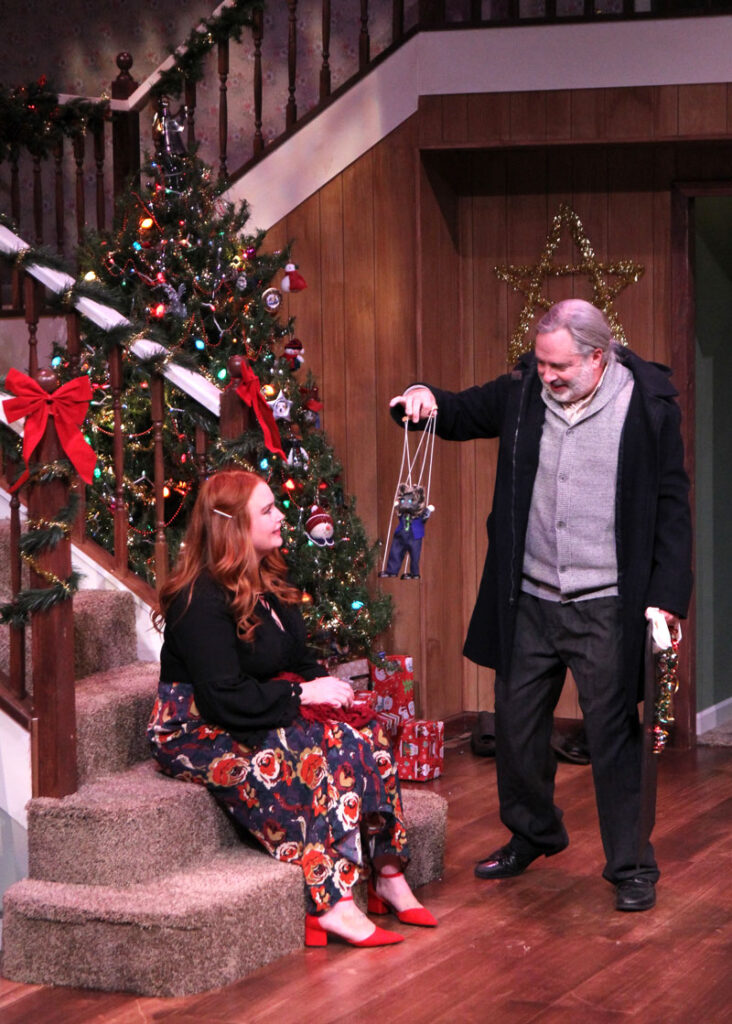
Buffalo Theatre Ensemble’s Season’s Greetings may just be the ticket for those looking for a different take on what the holidays mean to people. Written by the highly prolific British playwright Alan Ayckbourn, the slightly farcical, oddly dark play digs into the relationships of nine adults who’ve come together to celebrate Christmas in the English suburbs. A combustible mixture of relatives, friends and in-laws, all the ingredients are right for either the mundane exercise of annual ritual or mayhem. Wrapping his stories in the quaint charm of British etiquette and accents, Ayckbourn often upends convention by exposing the tensions roiling just below the surface. Right at the intersection of comedy and pathos is where he finds his sweet spot.
Contemporary U.S. and English holiday decorating styles are so similar they’re indistinguishable. That similarity made you think you were looking at an American themed Christmas living room in Season’s Greeting. Comfortable, warm and familiar, you immediately felt a kinship with the way the set radiated the holiday season.
Neville (Kurt Naebig) and his wife Belinda (Katelyn McKeon) are in the throes of hosting their friends and family over the three-day Christmas holiday. Neville’s sister Phyllis (Laura Leonardo Ownby) is there, not meshing too well with her sister-in-law, Belinda, drinking a little too much in the kitchen and quasi-avoiding her unusual husband, Bernard (Robert Jordan Bailey). Bernard, a not very good doctor by trade, likes putting on lengthy puppet shows that everyone else dreads. Getting all the kids guns for Christmas, cantankerous Harvey (Hugh Callaly) has a penchant for violence and exhudes a conspiratorial bent. He’s Neville’s and Phyllis’s uncle and could be safely considered a boorish hardliner. Loud, unapologetic, self-righteous and adept at rattling cages, Harvey’s antics are equal parts offensive and comically outrageous. It would be unwise to discount Harvey’s potential for menace. Eddie (Charles Loggins III), a good friend of Neville’s, is there with his wife, Patty (Renata Naomi). Perhaps a conscious effort at diversity resulted in Black actors being cast to play Eddie and Pattie. Some of the dialog would suggest that may not have been the most apt choice. When Eddie makes a comment about his children sleeping upstairs, it generates both a titter and a “did I hear that right” silence. The visual cue of Eddie’s SNL inspired Afro wig also provoked consternation. But Eddie and Pattie make up a recognizable team. She tolerates her husband’s shortcomings with good hearted resignation. Pattie is the balancing force in the relationship and Naomi is constantly on the verge of stealing the show with her sure-footed performance.

Rachel (Tina Shelley) acts as Season’s Greetings awkwardly endearing linchpin, the person whose decisions change the dynamics and trajectory of the holidays in the Bunker household. She’s Belinda’s sexually repressed 42-year-old sister who’s worked up the courage to invite a man to her family’s long Christmas weekend. With love on her mind, Rachel’s a whirling dervish of a mess. By her own confession, she’s as silly as a teenager contemplating the arrival of a new boyfriend. Thankfully she has full knowledge of herself and is in many ways as grounded as Pattie. Consumed by her own hopes of where her relationship with Clive (Brad Lawrence) might go, she doesn’t even consider how most of the other women at the house might react to her prospective beau.
Ayckbourn, who at 83 has written more plays than years he’s been alive, often delves into the murky world of imperfect marriages. With neither being what they could be, there are two in this holiday romp. Neville’s more interested in his remote control that turns on the Christmas tree lights than he is in his wife. He takes her for granted and hardly listens when she looks for reassurance about the robustness of their marriage. There’s not even a pretense of fire between Neville’s sister Phyllis and her husband Bernard. It might be a sterile union, but it’s also a relaxed and respectful one; at least usually. The arrival of an attractive man is all it takes though for both Belinda and Phyllis to start pondering what if’s. Based on Clive and Belinda’s reaction to each other, Phyllis’s fantasies don’t stand a chance.

From there, and well outside the view of children, the plot line goes to some very adult places. Is it possible that things could go so far so quickly in the real world? Sure. Alcohol’s notorious for compromising good judgment and what Belinda and Clive get up to counts as comically reckless. The way they fumble and stumble as they attempt to consummate their tryst qualifies as pure slapstick. That they’re foiled by their own ineptitude, and under the eyes of every other adult in the house, was inevitable. It’s the reactions to their heedless passion that makes Season’s Greetings such a deft teaching tool. We’re accustomed to drama begetting even more drama; but that doesn’t happen here. Of course, Rachel’s disappointed that her man finds her sister more romantically interesting. Rather than being crushed though, she chooses another course. Neville does, too. Wounded male pride doesn’t lead to macho-tinged histrionics. Instead, something more measured kicks in that endows Season’s Greeting with appealing equilibrium. The play’s closing message taps into the way our humanity, with all of it inherent flaws, requires an element of forgiveness to survive and thrive.
Season’s Greetings
Through Dec 18
Buffalo Theatre Ensemble
The McAninch Arts Center at the College of DuPage
425 Fawell Blvd.
Glen Ellyn, IL 60137